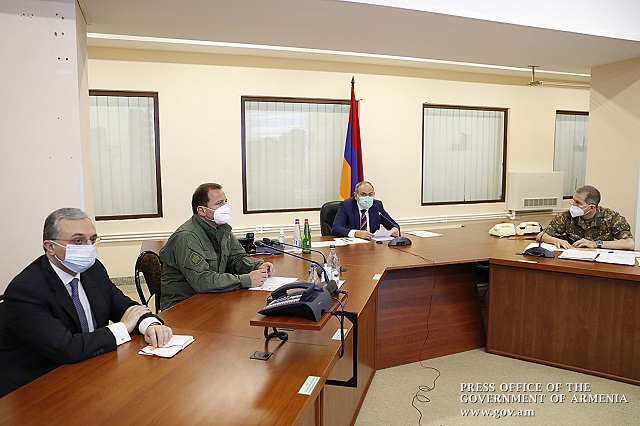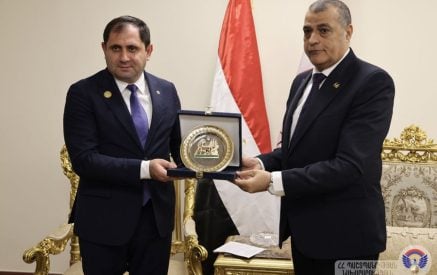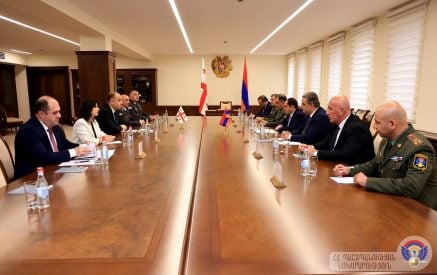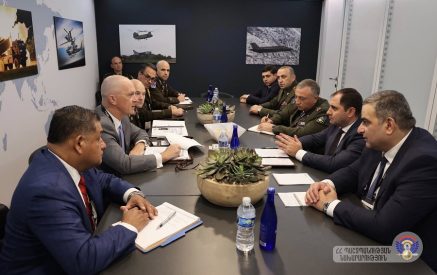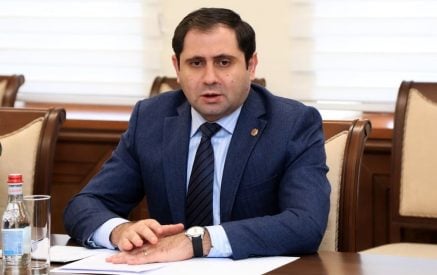Prime Minister Nikol Pashinyan visited the Ministry of Defense headquarters, where he met with the leadership of the Ministry of Defense and Armed Forces, headed by Defense Minister David Tonoyan and Chief of the General Staff of the Armed Forces, Lieutenant General Onik Gasparyan. Minister of Foreign Affairs Zohrab Mnatsakanyan attended the meeting.
In his speech, Prime Minister Pashinyan referred to the recent escalation on the Armenian-Azerbaijani border. The Prime Minister stated, in part: “The purpose of today’s meeting is to discuss the operative situation on the Armenia-Azerbaijan border. However, first of all it should be stated that the military-political situation in the region has become tense due to Azerbaijan’s aggression against the sovereign territory of the Republic of Armenia.
Late on July 12, Azerbaijan’s armed forces launched an attack and attempted to get hold of the Anvakh (Fearless) border post of Armenia’s armed forces. To give a comprehensive idea of the situation, it should be stated that the aforementioned position is located in the sovereign territory of the Republic of Armenia.
At the same time, Azerbaijan’s armed forces targeted the villages of Movses, Aygepar, Chinari, Nerkin Karmiraghbyur in Tavush region with artillery fire and drones, causing significant damage to civilian infrastructure and residential houses. We have evidence – factual data – that Azerbaijan’s armed forces have deployed artillery and armored vehicles in the courtyards between residential houses in the village of Aghdam, which faces Armenian Chinari village. They targeted our villages with the assumption that the Armenian side could not help hitting civilian targets in case of retaliation.
Read also
Dear Colleagues,
It is important to record the meaning and context of the events that are taking place in the region, because Azerbaijan’s offensive must have an explanation; therefore, the following question may arise: What does the military-political leadership of Azerbaijan want to do? Why?
Azerbaijan’s President Ilham Aliyev’s long-standing warlike rhetoric has intensified in recent months. He threatens to resolve the Karabakh conflict by force and openly demonstrates his intention to abort the OSCE Minsk Group’s mediation efforts. Against this background, he developed the thesis of the strength and invincibility of the Azerbaijani army in a bid to justify those billions of dollars spent over the past decade and a half under the pretext of army development.
The military-political leadership of Azerbaijan has repeatedly stated that it is waiting for an order from Ilham Aliyev to resolve the Karabakh conflict by military means. This continuous rhetoric had to get some expression. Naturally, against the background of aggressive statements made by the military-political leadership of Azerbaijan, we were supposed to be more vigilant for the security of Artsakh, attention should have been doubled on Artsakh’s Defense Army. Therefore, Azerbaijan decided to strike in the direction we should have expected the least with a single goal to materialize the myth of Azerbaijani army’s invincibility by means of an unexpected blow, to break down the moral and psychological positions of the Armenian side with a swift military success and ultimately attack the Republic of Artsakh in that situation.
The Armed Forces of the Republic of Armenia, however, showed an exceptionally high level of combat readiness. They not only secured the inviolability of Armenia’s borders, but also shattered the myth built up by the incumbent President of Azerbaijan for a decade and a half about the combat effectiveness of the Azerbaijani army.
At the same time, with the recent onslaught, Azerbaijan caused significant damage to those countries with which it is cooperating in the military-technical sphere, since our Armed Forces destroyed weaponry that was deemed to be invulnerable all over the world.
However, the biggest surprise is the condescending attitude of the military-political leadership of Azerbaijan towards its own soldiers’ lives who were doomed to death since the task set before them was obviously unachievable.
The provocation undertaken by the military-political leadership of Azerbaijan also has a much broader geopolitical context. In an attempt to cover up its own failure, the Azeri propaganda has started to develop a thesis that the Armenian armed forces are positioned to disrupt and dismantle the international energy infrastructure originating in Azerbaijan. This is done to present Armenia as a global threat.
But this absurd assertion can simply be thwarted by the fact that Armenia theoretically had the opportunity to take such an action far before last week’s events. But it has never had such a goal; it has never been on our political agenda, we never sought to create economic, political, military-political or security instabilities in the region and in the world.
Our task is to ensure our sovereignty, our borders, the security of our country and people, and to promote global security. It has become clear in recent days that Azerbaijan poses a threat not only to Armenia but also to global security. An Azerbaijani official stated a few days ago that their country could launch a missile attack on Metsamor nuclear power plant.
Armenia is capable of ensuring its own security, including the Metsamor nuclear power plant, but this is a statement that should be unequivocally considered a crime against humanity, because such an action is a threat to commit terrorism against humanity, it should be given an appropriate international response and probe.
As for what to do next, our position remains the same. We must all get out of the vicious cycle of mere statements about ceasefire violations: an international system of reliable ceasefire monitoring needs to be established.
And next, the negotiations held in the OSCE Minsk Group co-chairing format should be continued, and Azerbaijan should finally adopt a constructive position.
And finally, let me express my satisfaction with the high efficiency of the Armenian Armed Forces and state that the Government’s army development policy, including the development of the military-industrial complex, has fully justified itself. There is no doubt that we will continue along this line. As I have said on many occasions, the development of our armed forces is not a priority for us, but the priority of priorities.
And I would like to address a crucial issue that we have raised in this context, that is, the return to the state of ill-earned money obtained through corruption, and the investment of that money for the development of Armenia’s Armed Forces. This objective has not been met in full as of yet. But we will be consistent on this way: specific legal mechanisms have already been established to that effect, which will come into force in the near future.՞
INFORMATION AND PUBLIC RELATIONS DEPARTMENT OF THE OFFICE OF THE PRIME-MINISTER OF THE REPUBLIC OF ARMENIA




















































